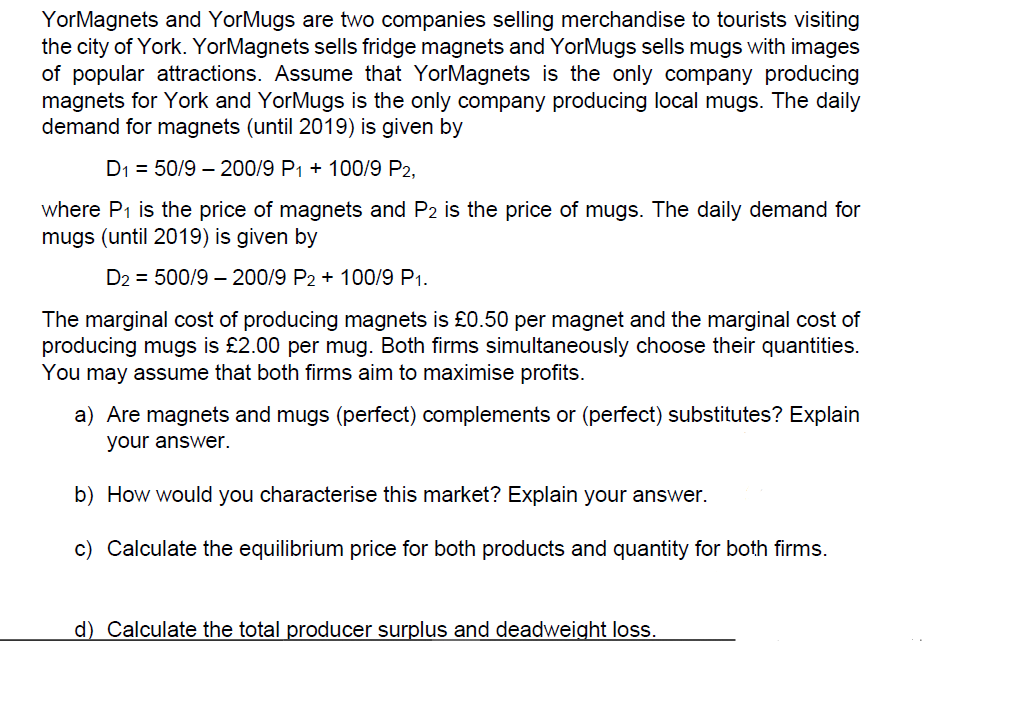YorMagnets and YorMugs are two companies selling merchandise to tourists visiting the city of York. YorMagnets sells fridge magnets and YorMugs sells mugs with images of popular attractions. Assume that YorMagnets is the only company producing magnets for York and YorMugs is the only company producing local mugs. The daily demand for magnets (until 2019) is given by D1 = 50/9 – 200/9 P1 + 100/9 P2.
YorMagnets and YorMugs are two companies selling merchandise to tourists visiting the city of York. YorMagnets sells fridge magnets and YorMugs sells mugs with images of popular attractions. Assume that YorMagnets is the only company producing magnets for York and YorMugs is the only company producing local mugs. The daily demand for magnets (until 2019) is given by D1 = 50/9 – 200/9 P1 + 100/9 P2.
Managerial Economics: Applications, Strategies and Tactics (MindTap Course List)
14th Edition
ISBN:9781305506381
Author:James R. McGuigan, R. Charles Moyer, Frederick H.deB. Harris
Publisher:James R. McGuigan, R. Charles Moyer, Frederick H.deB. Harris
Chapter2: Fundamental Economic Concepts
Section: Chapter Questions
Problem 5E
Related questions
Question

Transcribed Image Text:Due to lockdowns and travel restrictions in 2020 and 2021, the number of tourists that
visit York has significantly dropped.
e) Explain how a drop in tourists will have affected the demand curves. Also,
explain the effect on the equilibrium price and quantity and the resulting
producer surplus.

Transcribed Image Text:YorMagnets and YorMugs are two companies selling merchandise to tourists visiting
the city of York. YorMagnets sells fridge magnets and YorMugs sells mugs with images
of popular attractions. Assume that YorMagnets is the only company producing
magnets for York and YorMugs is the only company producing local mugs. The daily
demand for magnets (until 2019) is given by
D1 = 50/9 – 200/9 P1 + 100/9 P2,
where P1 is the price of magnets and P2 is the price of mugs. The daily demand for
mugs (until 2019) is given by
D2 = 500/9 – 200/9 P2 + 100/9 P1.
The marginal cost of producing magnets is £0.50 per magnet and the marginal cost of
producing mugs is £2.00 per mug. Both firms simultaneously choose their quantities.
You may assume that both firms aim to maximise profits.
a) Are magnets and mugs (perfect) complements or (perfect) substitutes? Explain
your answer.
b) How would you characterise this market? Explain your answer.
c) Calculate the equilibrium price for both products and quantity for both firms.
d) Calculate the total producer surplus and deadweight loss.
Expert Solution
This question has been solved!
Explore an expertly crafted, step-by-step solution for a thorough understanding of key concepts.
This is a popular solution!
Trending now
This is a popular solution!
Step by step
Solved in 2 steps with 4 images

Knowledge Booster
Learn more about
Need a deep-dive on the concept behind this application? Look no further. Learn more about this topic, economics and related others by exploring similar questions and additional content below.Recommended textbooks for you

Managerial Economics: Applications, Strategies an…
Economics
ISBN:
9781305506381
Author:
James R. McGuigan, R. Charles Moyer, Frederick H.deB. Harris
Publisher:
Cengage Learning

Managerial Economics: Applications, Strategies an…
Economics
ISBN:
9781305506381
Author:
James R. McGuigan, R. Charles Moyer, Frederick H.deB. Harris
Publisher:
Cengage Learning